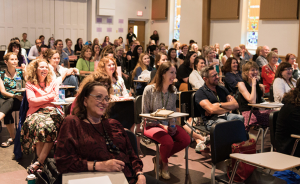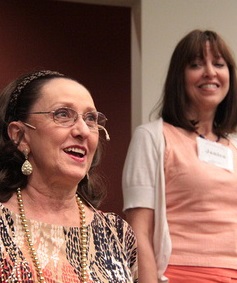 is an organized method of vocal training for Contemporary Commercial Music (CCM) styles, (those styles that used to be called “non-classical) based upon somatic (physical) awareness and aural discernment. The training is completed in three levels.
is an organized method of vocal training for Contemporary Commercial Music (CCM) styles, (those styles that used to be called “non-classical) based upon somatic (physical) awareness and aural discernment. The training is completed in three levels.

Join us for Special Topics in Somatic Voicework™ with Jeanie LoVetri, a November 2024 Webinar Series. Topics include:
People are always asking for two things:
“How can I get to work with Jeanie?” and, “Can Jeanie talk us through what she’s hearing and why she’s doing what she’s doing?” These new Somatic Voicework™ labs present just that!
Each Lab runs via Zoom from 1:30pm to 6:00pm EST with a half hour break in the middle.
Jeanie will work informally with participants one on one (or in small groups) on issues of their choice–like a mini lesson. There will also be opportunity to ask Jeanie questions along the way.
Places are limited and there are registration deadlines – register now to avoid disappointment.
Due to popular requests from people unable to attend this summer’s in-person LoVetri Institute for Somatic Voicework™, Jeanie LoVetri has put together a new webinar series that kicks off on Monday, May 6th from 6-8 PM EDT.
As always, for those who cannot complete the webinar series in real-time, all participants can complete the course at their own leisure. Participants will have access to the video archive for 12 months from the final day of the course.
Each week, Jeanie LoVetri presents a traditional academic-style lecture that will be followed by a practical exploration of Somatic Voicework™ with two singers. The session will end with a Q&A.
Please check out all the details below:
Special Topics in Somatic Voicework™
Dates: Mondays May 6th, 13th, 20th, June 3rd
Time: 6-8 PM EDT
Week I: Science-Based Voice Pedagogy (May 6th)
What are the ingredients of basic vocal function training? Is there a best way to present them in a singing lesson? What should be avoided?
Week II: Working with Kids & Teens (May 13th)
Many teachers of singing who do private lessons or who work with choirs have questions about vocal health, appropriate range, good musical choices and making adjustments for age and ability.
Week III: Singing Louder, Faster, Higher, Better (May 20th)
Some voices are naturally strong, others are naturally flexible. Optimal vocal response cultivates the opposite response to cultivate a balanced instrument.
Week IV: Conditional, Habitual, & Authentic. Why Taking Your Time Is The Fastest Way
Finding your “true voice” is a journey. Along the way, we encounter assumptions, habits, patterns, and what others recognize as “your voice.” Teaching that seeks a quick fix doesn’t work as a solid, lasting basis from which to sing for a lifetime. Learn how to cultivate a roadmap for long-term voice training.
Cost Per Webinar Series: $150/$200 USD ($150 USD for Somatic Voicework™ graduates of at least Level I; $200 USD for those who have not completed any of their Somatic Voicework™ levels).
Each week, Jeanie LoVetri presents a traditional academic-style lecture that will be followed by a practical exploration of Somatic Voicework™ with two singers. The session will end with a Q&A.
Register now for the Somatic Voicework™ May 2024 Webinar Series.
Did you hear the big news? Jeanie LoVetri, the founder of Somatic Voicework™, is thrilled to announce a completely FREE webinar series that kicks off Monday, April 15th from 6-8 EDT!
Please share this post with fellow voice teachers, singers, choral directors, speech pathologists, music directors, your students, and anyone you know who may be interested in exploring Somatic Voicework™.
To Register, Click Here: https://us02web.zoom.us/
For more details about Somatic Voicework™, Click Here: https://bwcommunityarts.bw.
Each week will feature a traditional academic-style lecture, followed by a practical exploration of the work with Jeanie LoVetri demonstrating with students.
Here are the details about the Somatic Voicework™ April FREE Webinar Series:
Week I: An Introduction to Somatic Voicework™
Monday, April 15th, 6-8 PM EDT
A traditional academic-style lecture will explore the underpinnings, foundations of pedagogy and guiding principles of Somatic Voicework™. This will be followed by a practical exploration of Somatic Voicework™ with two singers.
Week II: Belting – The Science & Art
Monday, April 22nd, 6-8 PM EDT
So many ways to belt! So many ideas and opinions! Which ones are healthy? Which allows you to sing in other styles? How many ways can someone belt or sing a belt/mix? How has belting changed over the years? Come find out!
Week III: Vocal Exercises Explained
Monday, April 29th, 6-8 PM EDT
Jeanie LoVetri breaks down the scientific underpinnings of vocal exercises. Why do they work? How do they work?
To register, click here: https://us02web.zoom.us/